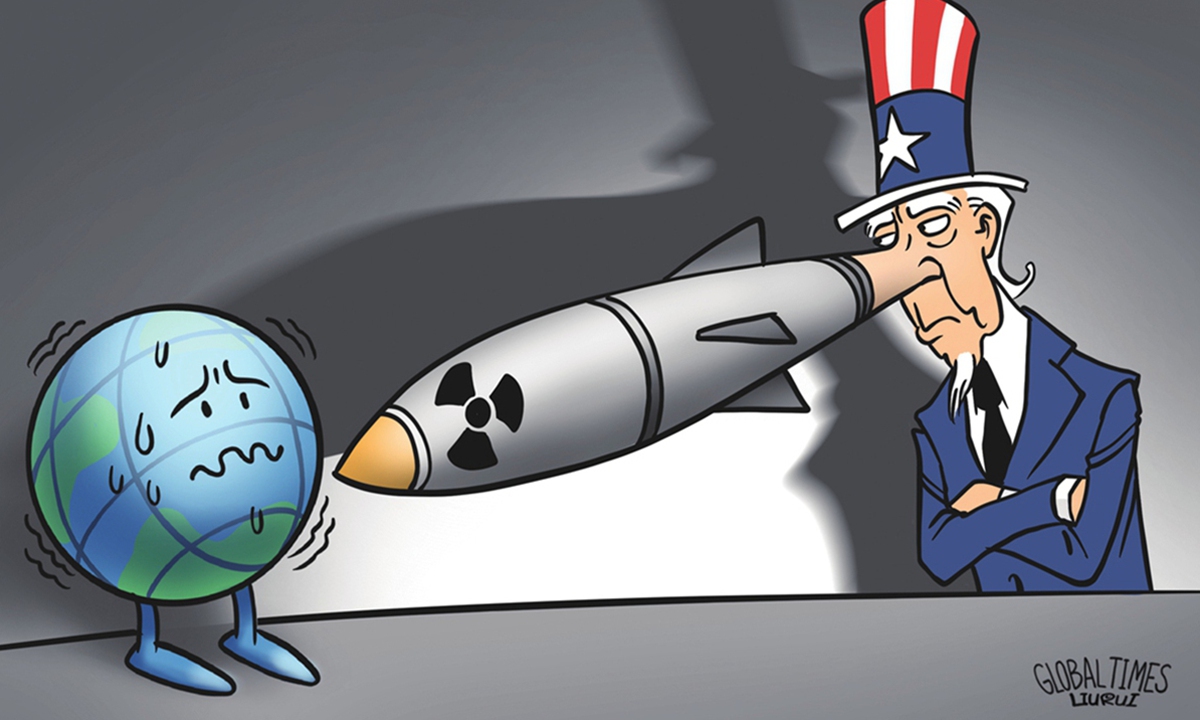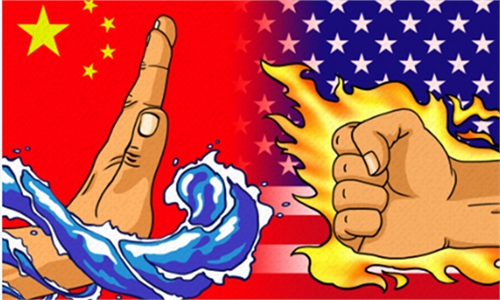Communication with US to prevent miscalculation is critical, while China reserves the right to build a strong nuclear arsenal

US nuclear power Illustration: Liu Rui/GT
US officials told media on Wednesday that China and the US will hold rare nuclear-arms control talks next week. According to a Wall Street Journal report, the discussion doesn't signal the start of formal negotiations to set limits on each side's nuclear forces, but will provide American officials with an opportunity to probe their Chinese counterparts about Beijing's nuclear doctrine and the ambitious buildup of its nuclear arsenal. The meeting is the first of its kind with Beijing since the Barack Obama administration.Washington has been trying to bring China into US-Russia nuclear arms control negotiations to limit China's nuclear arsenal. Beijing has not agreed, for the simple reason that the amount of China's nuclear weapons is only equivalent to a fraction of the quantity possessed by the US and Russia, and nuclear arms control is a special responsibility of the US and Russia. The Donald Trump administration suspended the Intermediate-Range Nuclear Forces Treaty, citing China's unconstrained arsenal as one of the reasons.
However, the main purpose of this arms control meeting between China and the US is obviously communication, and it's far from talking about achieving a target of arms control. Last month, the US side stated that China already has 500 operational nuclear warheads and predicted that this number would reach 1,000 by 2030. Last year, the US predicted that China's nuclear warheads would reach 1,500 by 2035. The US side is concerned that the US is facing not one, but two nuclear adversaries.
On the one hand, building a strong nuclear arsenal is China's right and a necessity as a responsible major power, and China's possession of a long-term reliable nuclear deterrent is conducive to maintaining the strategic stability between the US and China and even in the world, which is more important than the short-term détente of the China-US relationship. On the other hand, China and the US do need to strengthen communication around this critical issue to prevent serious miscalculation.
I believe that the Chinese side should make the following clear to the US side:
First, China is building its nuclear arsenal to hedge against rising strategic risks and to achieve a new security balance. In other words, China's security situation has changed, and the minimum size of the nuclear arsenal needed to defend China's national security has changed along with it, so it must be much more powerful than it was in the past. What remains unchanged is China's defensive military strategy, and we will not at any time use nuclear weapons as a proactive tool in external competition.
Second, China is firmly committed to the "no-first-use" nuclear policy. A senior defense official said last month that although China hasn't changed its no first use policy, it "certainly raises question about what is their long-term intent." This is obviously due to the low threshold for the use of nuclear weapons on the side of the US, and they have such concerns by measuring another's corn by their own bushel.
For China, nuclear weapons are only a strategic tool used to rule out the possibility of nuclear strikes or blackmail against China by external forces. All of China's national defense and security plans, including the use of force as a last resort to resolve the Taiwan question, are designed at the level of conventional weapons. The role of nuclear weapons is very latent, it is meant to deter external forces from adding nuclear weapons to shape the war situation. There is no association of first use of nuclear weapons not only by the Chinese government and military, but also by the Chinese people. "China's first use of nuclear weapons under exceptional circumstances" is a complete false proposition.
Third, the US already possesses the most powerful and comprehensive nuclear force in the world, but it continues to invest heavily in modernizing its nuclear arsenal. What exactly does the US want to do? The US Air Force said on Wednesday it had blown up a Minuteman III missile over the Pacific Ocean after an anomaly was detected, causing a sensation in world public opinion. The US is the largest source of the world's arms race. Its endless greedy pursuit of absolute military superiority makes the Chinese people feel uneasy. We should ask the US to stop its continuous expansion of nuclear power which is already at its peak. This is the basis for the practical significance of arms control.
Fourth, China supports international efforts to prevent nuclear proliferation, and the US position in this regard should not sway. The US helps Australia develop nuclear submarines, setting a dangerous precedent for nuclear proliferation. Dangerous discussions surrounding nuclear possession have emerged from time to time in Japan and South Korea, and the US needs to pay more attention to its allies. China should clearly voice its concerns to the US.
I believe that the Chinese government can respond to the concerns of the outside world while strengthening its nuclear power building so that our nuclear deterrence capabilities and the outside world's good impression of China can both be further improved together. China is a peace-loving and responsible country, and this should be fully known to the whole world. Due to the continuous smear campaign by the US and West, it will not be an easy task for China to set up a positive image in the world.
The author is a media professional. opinion@globaltimes.com.cn



